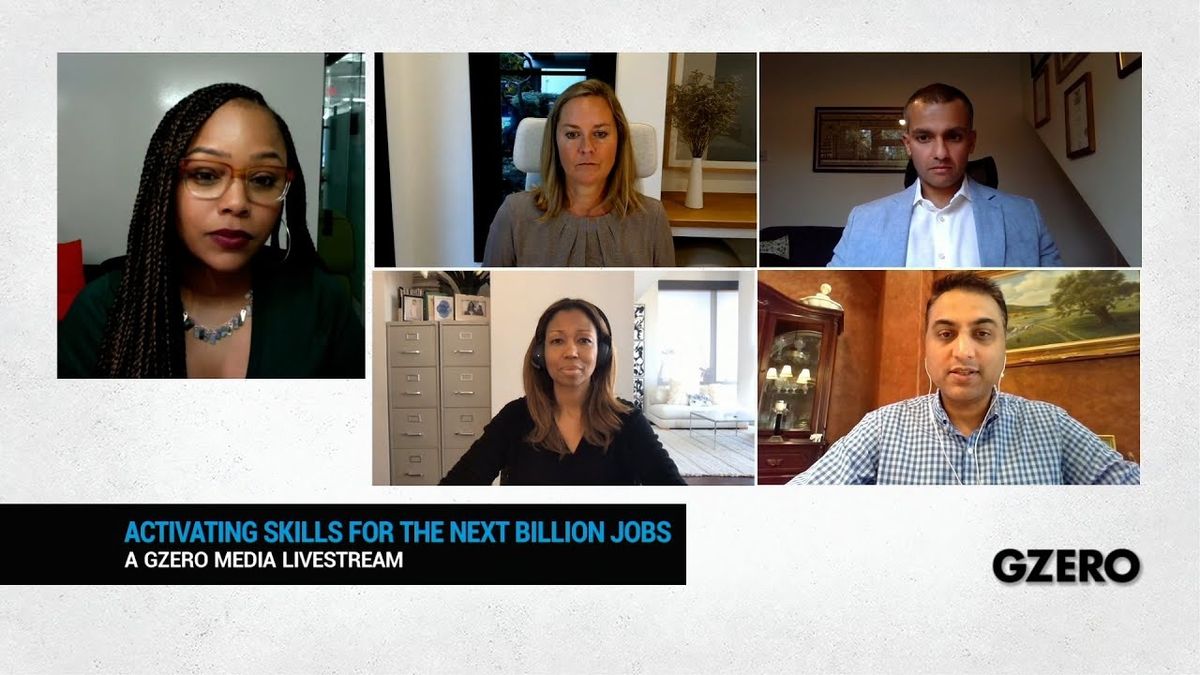On October 7th, GZERO Media — in partnership with Microsoft and Eurasia Group — presented a live panel discussion, "Digital Inclusion: Connectivity and Skills for the Next Billion Jobs," about the acceleration of digitalization, the changing workforce, and the need for digital access for all.
The conversation was moderated by Sherrell Dorsey, founder and CEO of The Plug, and our panel included:
- Kate Behncken, Vice President, Microsoft Philanthropies
- Lisa Lewin, CEO of General Assembly
- Parag Mehta, Executive Director and Sr Vice President, Mastercard Center for Inclusive Growth
- Dominique Hyde, Director External Relations, United Nations High Commissioner for Refugees
- Rohitesh Dhawan, Managing Director, Energy, Climate & Resources, Eurasia Group
Also featured: special appearances by Michelle Bachelet, United Nations High Commissioner for Human Rights and former president of Chile, and Doreen Bogdan-Martin of the International Telecommunications Union.
A key theme that emerged during discussion was whether internet connectivity should be a human right. For Dhawan, digital inclusion is critical to achieving the UN Sustainable Development Goals, as we have seen during the pandemic how connectivity plays out in real life for all of us. It's also affecting anxiety about long-term student outcomes, said Behncken, who underscored the importance of giving schools proper IT infrastructure so they can train teachers, too.
As for how COVID-19 will affect job skilling, Hyde mentioned how refugees will likely suffer the most because they have the least access to tech. To fix that, Behncken proposed investing in quality education so migrants can become self-sufficient through nurturing their own talent.
Governments have a role to play in all of this. During the Great Depression in the US, Mehta pointed out, the government stepped up to provide jobs. Now, he said, there's an enormous opportunity to accomplish the same goal but indirectly — by empowering small businesses to become job creators through digitalization.
For Lewin, successful reskilling begins with a mindset that recognizes the critical importance of workers and why they are central to the long-term success, competitiveness, and talent value of any organization, public or private.
At this critical moment for connectivity, Bogdan-Martin proposed that the public and private sectors work together to craft a common policy for new digital jobs. But what does that look like? For Dhawan, it's time to invest in public-private connectivity infrastructure investments that will help create far more jobs than spending on roads or bridges.
Finally, however good a policy may be, it won't work until we remove barriers to access on learning and skilling. Lewin said that since no one school or university can do it alone, governments and private firms need to join the challenge so this crisis doesn't have an even more disproportionate impact of the crisis on marginalized communities worldwide.
Watch the other discussions in our four-part livestream panel series about key issues facing the 75th United General Assembly.


















